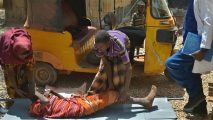27, November 2017
China denies role in Zimbabwe’s coup 0
China’s Foreign Ministry has denied playing a role in the recent political developments in Zimbabwe that led to the ouster of long-time ruler Robert Mugabe.
“China always upholds the principle of non-interference in other countries’ internal affairs and this remains unchanged,” Chinese Foreign Ministry spokesman Geng Shuang said Monday while congratulating Zimbabwe’s new President Emmerson Mnangagwa.
Geng also denied claims that a visit by Zimbabwe’s army chief General Constantine Chiwenga shortly before the political crisis erupted in Harare earlier this month was a sign of China’s role in the developments that led to Mugabe’s house arrest.
Geng said Chiwenga’s visit was pre-planned and had nothing to do with the political situation in Zimbabwe.
“It was planned long before and it was also approved by the former president Mugabe,” said the official, adding that the visit was a “normal interaction.”
For nearly half a century, China has maintained a huge influence in Zimbabwe as it originally supported anti-colonial guerrilla fighters in the 1960s and then helped their leader Mugabe rise to power in the South African country.
Beijing backed Mugabe during his 37 years in power and has been among Zimbabwe’s major trade partners.
Mnangagwa, who served as Mugabe’s deputy for years, also received training in China during the liberation struggle of the 1960s.
The spokesman said Mnangagwa, whose sacking by Mugabe sparked the political unrest in Zimbabwe, could further steer Zimbabwe toward progress.
“We congratulate President Mnangagwa on his inauguration … We firmly support Zimbabwe following a path that supports its own national conditions and we believe under the leadership of Mr Mnangagwa Zimbabwe … national development will make further progress,” Geng said.
Source: Presstv































2, December 2017
French Cameroun Military Operation: Biya has by this misadventure put a pistol on his own head 0
The military operation ordered by Paul Biya is an escalation of the genocide campaign that has been ongoing since French Cameroun invaded Southern Cameroon fifty six years ago and commenced a military campaign of terror and genocide that has claimed millions of Southern Cameroon lives and devastated the economy and way of life of the people.
With the public declaration of the escalation of the genocide campaign, targeting all Southern Cameroonians, Ambazonians must now declare the right to self defense and declare that any French Cameroon soldier, administrator or whosoever aids in its war effort or administration to vacate the Southern Cameroon. The Federal Republic of Amabazonia will protect all civilians and civilian targets and abide by the laws and customs of war in prosecuting this war of self defense.
French Cameroun soldiers who lay down their arms and refuse to kill Southern Cameroonians will not be hurt so also their families. Those who kill Southern Cameroonians or obey the criminal orders of Paul Biya will be hit even in their own territory and homes. They will have nowhere to hide. Ambazonia will win this last limp of the fifty six years war against its people.
No soldier of fortune of French Cameroun deployed to commit genocide, rape, maim and loot will return alive. With international law and justice on the side of Ambazonia, the enemy will soon learn the hard reality of history which the reckless ambitions of Adolf Hitler Paul Biya have brought unto the free world.
Like his mentors Hitler, Biya has by this misadventure put a pistol on his own head and that of his country French Cameroun. Ambazonia by the end of this campaign will prevail by totally liberating itself while helping Biya to terminate his satanic misadventure.
By Soter Tarh Agbaw-Ebai